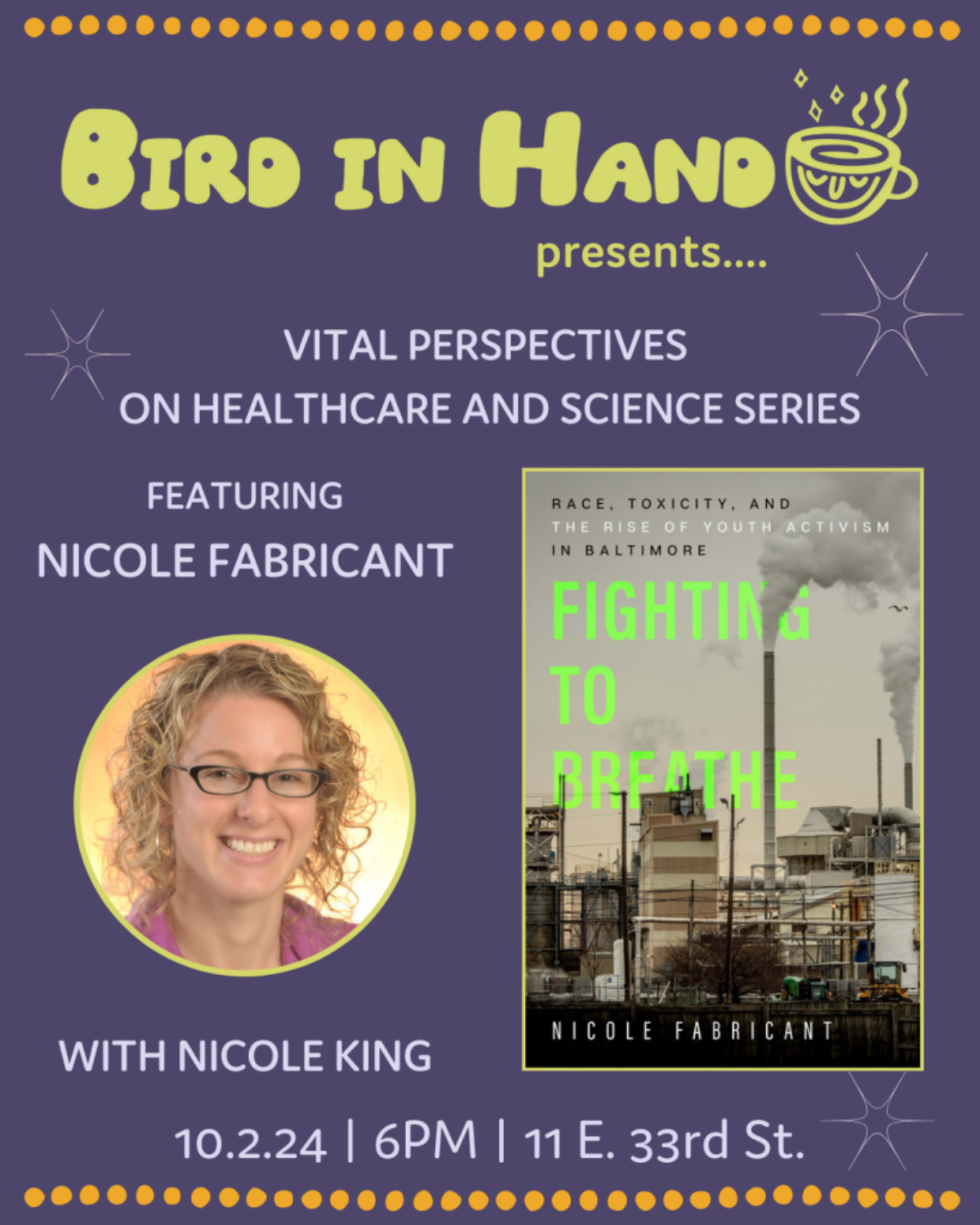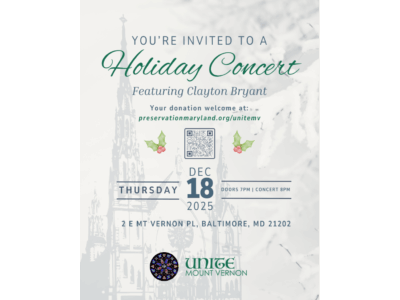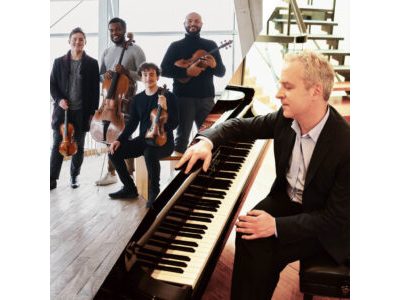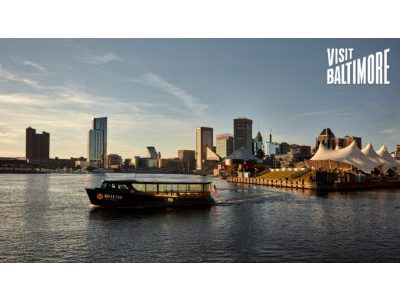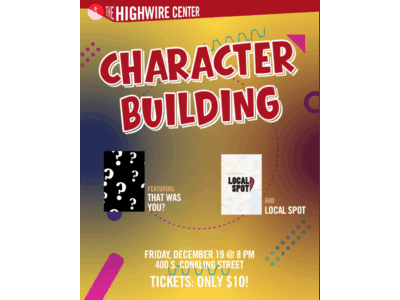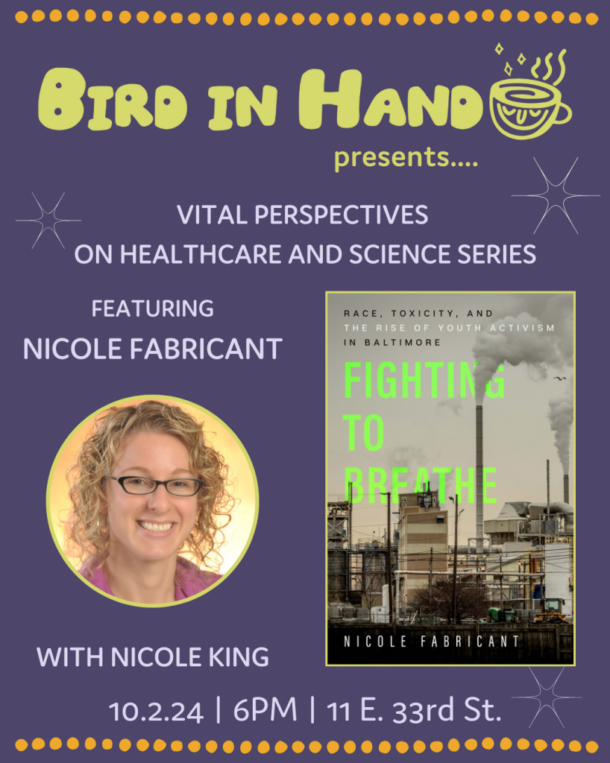
Vital Perspectives on Healthcare and Science: Nicole Fabricant, FIGHTING TO BREATHE (with Nicole King)
The Vital Perspectives on Healthcare and Science series returns to Bird in Hand! This series engages with some of the most pressing public health issues of our time, in a regular public forum catalyzed by a book. The October edition, focused specifically on Baltimore, features Dr. Nicole Fabricant, author of FIGHTING TO BREATHE: Race, Toxicity, and the Rise of Youth Activism in Baltimore, with Dr. Nicole King joining in conversation.
FIGHTING TO BREATHE is an essential book for Baltimore. Industrial toxic emissions on the South Baltimore Peninsula are among the highest in the nation. Because of the concentration of factories and other chemical industries in their neighborhoods, residents face elevated rates of lung cancer and other respiratory illnesses in addition to heart attacks, strokes, and cardiovascular disease, all of which can lead to premature death. Fighting to Breathe follows a dynamic and creative group of high school students who decided to fight back against the race- and class-based health disparities and inequality in their city. For more than a decade, student organizers stood up to unequal land use practices and the proposed construction of an incinerator and instead initiated new waste management strategies. As a Baltimore resident and activist-scholar, Nicole Fabricant documents how these young organizers came to envision, design, and create a more just and sustainable Baltimore.
Nicole Fabricant received a BA from Mount Holyoke College in 1999 in urban anthropology and a Ph.D. from Northwestern University in 2009. She completed a presidential post-doc at the University of South Florida in 2010 where she focused on the global water crisis and joined Towson University in the Fall of 2010. Dr. Fabricant’s teaching interests include Revolution in Latin America, Resource Wars of the 21st Century, Environmental (In)justice, and Gender and Labor in Latin America.
For the past several years, Dr. Fabricant has been developing a Participatory Action Research (PAR) project that is presently investigating structural injustices in Curtis Bay, South Baltimore. Much of the data collection and analytic work is being conducted by Benjamin Franklin high-school youth alongside Towson University students who are completing their senior capstone in anthropology. One major question has animated this research: Why do communities experience environmental problems and hazards unevenly? Towson University students have assembled small research collectives and worked collaboratively with youth to document the multiple layers of industrial toxicity, and the cumulative effects upon residents’ health and well-being. The PAR project with undergraduates and high-school students feeds directly into her broader research agenda, as we are creatively mapping how environmental hazards lead to political action or inaction during specific historic moments.
Nicole King is an associate professor of the Department of American Studies, an affiliate professor in the Language, Literacy, and Culture doctoral program, and director of the Orser Center for the Study of Place, Community, and Culture at UMBC.
She received her PhD in American studies from the University of Maryland, College Park in 2008 and a MA in comparative literature and cultural studies from the University of New Mexico in 2001. Her research and teaching interests focus on issues of place, power, and economic development. King’s scholarship analyzes changes to the social and built environment during the rise of consumer culture in the twentieth century—such as the development of vernacular landscapes of tourism in the U.S. South and the decline of industrial neighborhoods in Baltimore. She is an editor of the book Baltimore Revisited: Stories of Inequality and Resistance in a U.S. City (Rutgers University Press, 2019) and the author of Sombreros and Motorcycles in a Newer South: The Politics of Aesthetics in South Carolina’s Tourism Industry (University Press of Mississippi, 2012). She co-founded the Baltimore Traces: Communities in Transition public humanities project where students work with local partners to research historic neighborhoods and complete oral history interviews focused on preserving the opinions of those who live and work in Baltimore. King’s research and teaching is based on the belief that looking and listening to a place can be a transformative act.
